
A 2022 CHG Healthcare survey found that nearly half of physicians changed jobs during the pandemic. While conditions have improved, healthcare organizations continue to struggle with a changeable physician workforce. A 2024 CHG Healthcare study found that a majority of physicians surveyed have made a career change in the past two years.
The new survey, which looked at both job moves and other career changes, found that 62% of physicians had made some type of career change in the past two years. About 2 in 5 physicians surveyed (39%) changed job types or employers, while 15% took on a side job or other contract work; 6% retired, and 2% left patient care for non-clinical work.
Physician career changes, Feb. 2022 – Feb. 2024
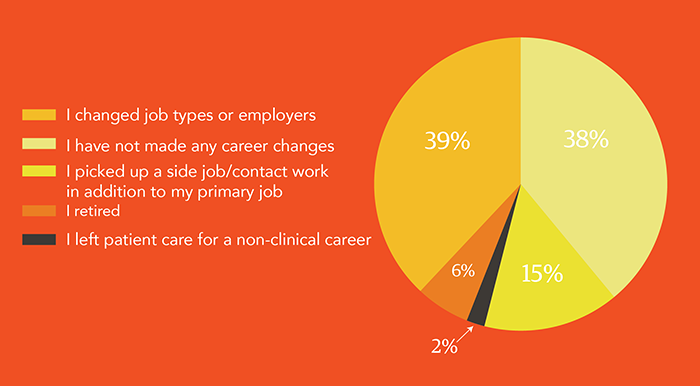
In comparison, the 2022 survey found that 43% of physicians had changed job types or employers in the past two years, 8% retired, and 3% left for a non-clinical career. The 2022 survey did not ask about side work.
Career changes by physician specialty
The likelihood of career changes varied widely between physician specialties. The specialists least likely to have made a career change of any kind were internal medicine (IM), pediatrics, and IM subspecialties.
Physician specialties least likely to have made a career change
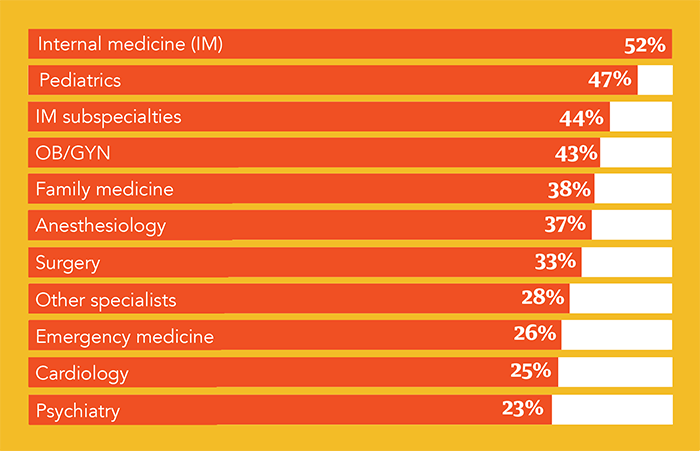
The physician specialties most likely to have changed job type or employer were the non-IM (other) specialists — such as neurology, radiology, ENT, urology, PM&R, and pathology — followed by emergency medicine, psychiatry, and family medicine.
Physician specialties most likely to have changed job type or employer
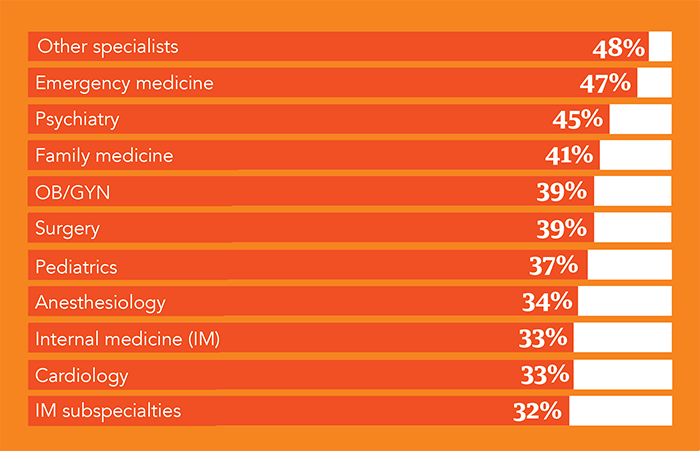
Physician side work
Fifteen percent of physicians reported that they’d taken on extra side work during the past two years. Of those, 60% accepted locum tenens assignments, while 40% engaged in moonlighting. Some engaged in more than one type of side job, including telemedicine and non-clinical work (respondents could choose more than one option).
Types of physician side jobs and contract work
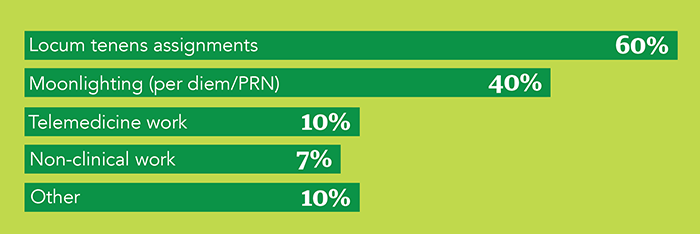
With locum tenens work, physicians take temporary assignments for a specific facility and work regular schedules over the course of the assignment. Some — but not all — locums assignments involve travel to a facility outside the physician’s region. Moonlighting, on the other hand, is when a physician provides as-needed coverage for a facility in their area. Moonlighting can involve irregular, unpredictable hours and shifts.
Physicians and locum tenens work
The 2024 survey also revealed that physicians are turning to locums work in significantly greater numbers than in prior years. In the newest survey, 44% of physicians reported changing jobs to work locums assignments either full or part time, compared with 28% in the 2022 survey.
Types of physician job changes
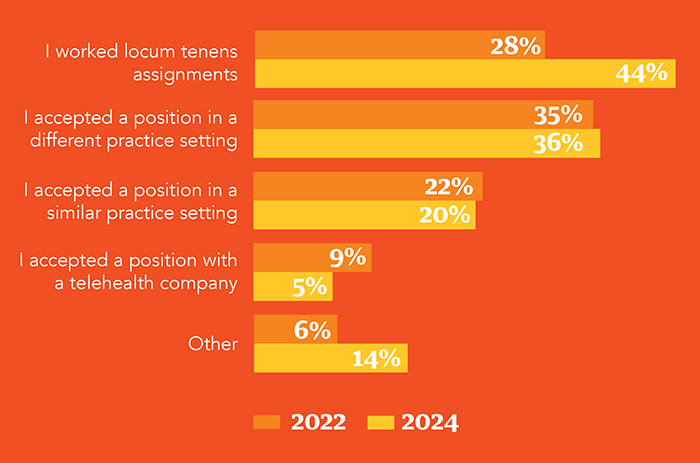
Other job changes included moving to a different practice setting (36%), taking a new job in a similar practice setting (20%), or joining a telehealth company (5%). Some of the “other” job changes included:
- Starting a private practice
- Pursuing additional fellowship training
- Transitioning into an administrative role
- Consulting
Physician motivation for career changes
A majority (51%) of physicians said they made their career change for better work/life balance. However, a more flexible work schedule (34%), better workplace culture (29%), and increased compensation (27%) were also top motivators.
Reasons for pursuing a physician career change
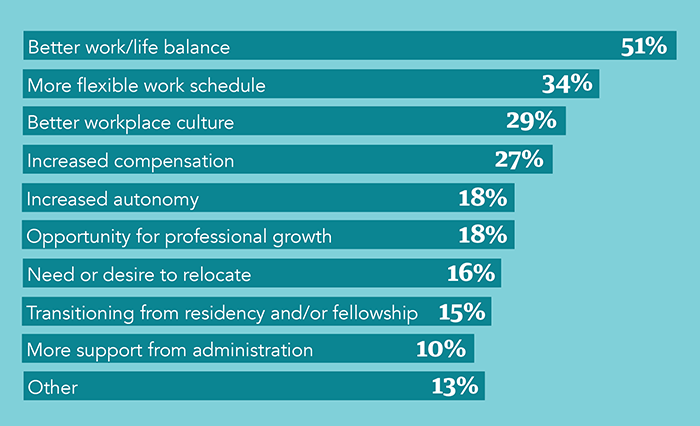
Physician career change motivation by gender
Motivations for the job change differed based on gender. Respondents could select up to three reasons for making a change. The desire for a better work/life balance was the top motivator for both women and men. However, the share was 58% for women compared with 44% for men, indicating better work/life balance may be a stronger motivator for women.
The second strongest motivator for women was a more flexible schedule (41%), while the second greatest motivator for men was a desire for higher compensation (36%).
For women, the third strongest motivator was better workplace culture (35%), while for men, it was a more flexible schedule (29%).
In general, women were more likely to change jobs for work/life balance, better workplace culture, and a more flexible work schedule. On the other hand, men were nearly two times as likely to change jobs for higher compensation and were more motivated to switch for professional growth reasons.
Reasons for career change by physician gender
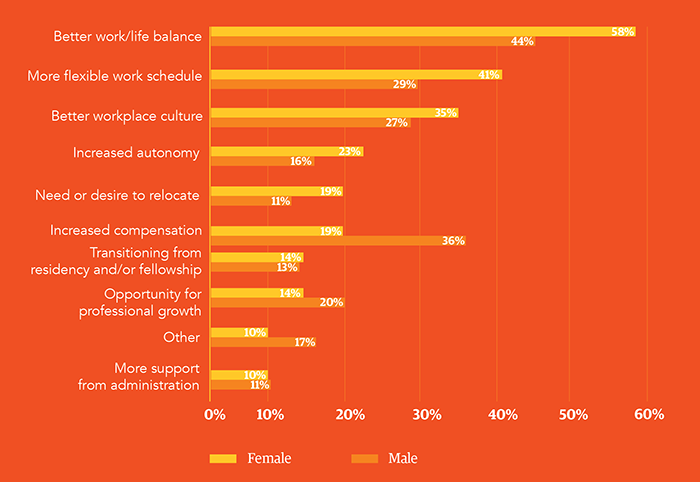
Differences in physician motivation by career stage
When viewing career change motivators through the prism of career stage, a desire for better work/life balance was the biggest job-change motivator for physicians in every career stage.
Late-career physicians were also highly motivated by a desire for schedule flexibility (50%). Mid-career physicians were the most motivated by higher compensation (40%). Unsurprisingly, job changes for early career physicians were often a result of a transition from residency and/or fellowship (35%).
Reasons for career change by physician career stage
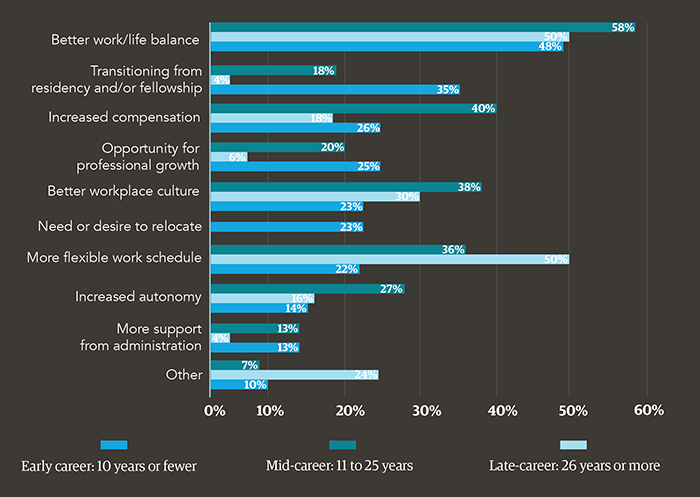
Physician career satisfaction
Despite the high percentage of physicians who made career changes, overall physicians say they are satisfied with their career choice. Two-thirds (67%) said that they were somewhat or completely satisfied with their career.
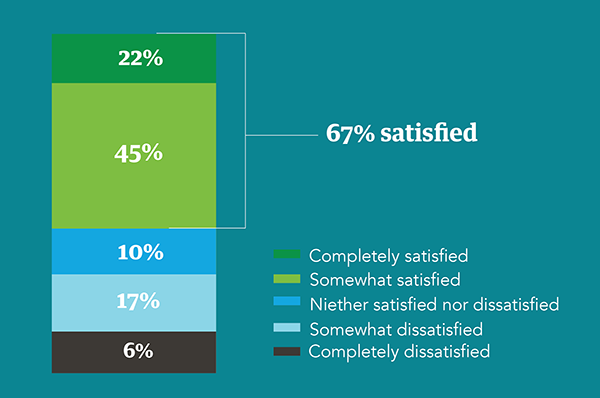
Satisfaction levels differed by employment type. Independent contractors, which includes locum tenens physicians, had the highest level of career satisfaction at 75%. The lowest rates of career satisfaction were among those in private practice (61%) and academic medicine (62%). A full 14% of physicians in private practices expressed complete dissatisfaction with their career.
Physician career satisfaction by employer type
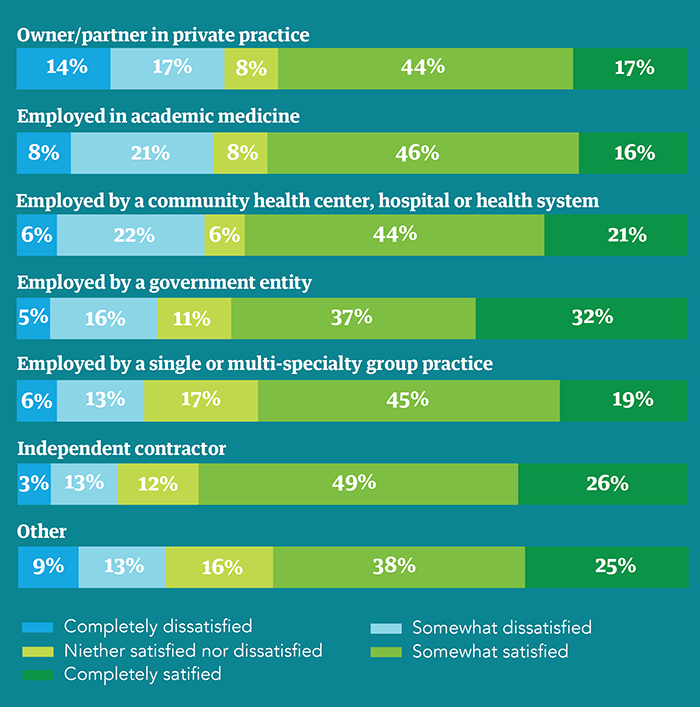
Physicians plans for the future
Looking forward, most physicians said they don’t have immediate plans to switch roles; 71% reported they were likely to remain in their current position through 2024. However, that commitment drops over time, with only 44% planning to remain in their current role beyond 2025.
Likelihood of physicians to remain in their current role
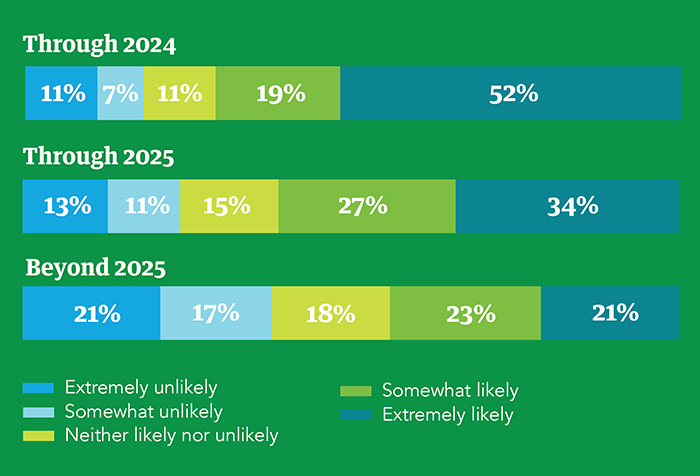
Leaving medicine was the least common career change for physicians over the past two years, with just 2% of physicians reporting they’d left patient care. However, 6% said they were either somewhat or extremely unlikely to remain in healthcare through 2024, while roughly 15% said they were unlikely to remain in healthcare beyond 2025, much of which may be attributed to retirement plans.
Methodology
CHG Healthcare surveyed 451 physicians from across the U.S. to determine the prevalence of career changes since February 2022, as well as motivators for change, the likelihood of career changes in the next two years, and overall career satisfaction.
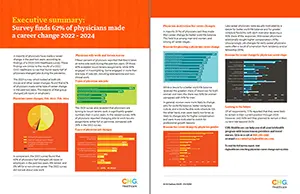
CHG can provide your healthcare facility with the locum tenens physicians and advanced practice providers you need to grow your organization. To learn more, contact us by phone at 866.588.5996 or email ecs.contact@chghealthcare.com.